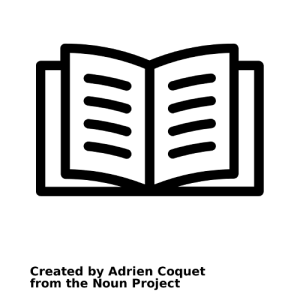Session Logistics
- Format: asynchronous
- Time required: 4 hours
![]()
Welcome to Session 8
Welcome to Session 8. As a reminder, you’ll make progress toward the following objectives in Phase 3:
- Designing and developing key course components grounded in principles and values of Open.
- Identifying necessary support and connections for implementation of Open work.
- Distinguishing between license options and the impacts on creators’ intellectual property.
- Developing language to discuss concepts of intellectual property with their students.
Experiencing a mindful moment
Let’s take a moment to center ourselves and ground into the work that is ahead for Session 8. Follow along with this 90-second mindful moment meditation.
Exploring Creator Rights
Review the following examples to deepen your understanding of what Creative Commons licenses and acknowledgments can look like in practice.
(The following examples were contributed by Liz Thompson)
- This is an example of starting the book with an acknowledgment page (see the Introduction page) and then providing more detail in the chapters (see the authors listed at the top of each section, 1.1 as an example). Notice the way they attribute by listing authors at the top of the page – it eliminates the need for footnotes. The order of authors changes if you scan the table of contents, and we then assume that the first author provided more content for that section. So instead of citing each paragraph or sentence, you simply list the authors of CC-licensed materials in order of contribution. You will need to follow more traditional citation formats when using copyrighted quotes, videos, websites, etc.
- The following examples demonstrate how to indicate if your work is adapted. Again, look at the bottom of this page from the Spanish textbook here. Also, see the cover page of this text and look at the listed Authors under the title.
- Review the beginning of this introduction page to see an example of how to handle attributions when pulling together “chapters” or pieces of content from multiple sources. Also, note how the creators included a Chapter resources page at the end of each chapter since they were drawing from multiple sources.
- Using the Pressbooks directory, you can filter to search for “student-led OER projects”. Scroll down on this page to view these filtered results and explore how the various projects handle licensing and attributions.
As a reminder, we provided the following resources in a previous session. Feel free to review again to explore strategies that can support your plans for helping students make licensing decisions for their work.

- Statement on Student Rights in Open Environments
- Student Agreement to Publish Course Work under a Creative Commons Licence
Book by Adrien Coquet from Noun Project (CC BY 3.0)
Evolve Guide, Activity 16
Considering what you have learned about the role of licensing and how that impacts creators’ rights. Take some time to reflect and develop additional language about creators’ rights and licensing as it specifically relates to your project.
Exploring resources and supports for implementing open work
To further support your development with open pedagogy and other open educational practices, below are four resources we recommend becoming familiar with:
- Open Education at JMU
- This resource is maintained by JMU Libraries and provides information about workshops, grant opportunities, and more related to open education.
- VIVA Open and Affordable Initiatives
- VIVA is our state libraries consortium and supports open education work.
- They annually host the Open and Affordable Community Forum. For past agendas and future opportunities see their site
- Open Education Conference
- An annual conference for sharing and learning about open educational resources, open pedagogy, and open education initiatives
- Open Education Global
- A global, members based, non-profit organization supporting the development and use of open education around the world.
Evolving your open practices
Evolve Guide, Activity 17
- At the end of session 6, you wrapped up the project design template. Go review what you identified as Next Steps (at the bottom of your Project Design Template) related to identifying the curricular materials, assessments, and pedagogical strategies. What progress have you made since then? What tools and/or platforms have you decided to use in the implementation of your project?
- As we wrap up Phase 3 and wind to a close of the fellowship, how would you describe what having a “world view of open” means to you personally, as an educator, and/or as a scholar?
![]() As we are wrapping up Phase 3, we are asking you to contribute to the formative assessment for the program. This activity is a formative assessment reflection for you to consider your own progress in the program as well as to provide feedback for facilitators. Completing these formative assessment surveys is considered a critical component to fulfilling the requirements of this program (as outlined in the initial MOU). We appreciate you taking the time to reflect on your experience thus far in this formative assessment and for all of your contributions to the program. The facilitators will email you the link to the survey.
As we are wrapping up Phase 3, we are asking you to contribute to the formative assessment for the program. This activity is a formative assessment reflection for you to consider your own progress in the program as well as to provide feedback for facilitators. Completing these formative assessment surveys is considered a critical component to fulfilling the requirements of this program (as outlined in the initial MOU). We appreciate you taking the time to reflect on your experience thus far in this formative assessment and for all of your contributions to the program. The facilitators will email you the link to the survey.
evaluation by nugra from Noun Project (CC BY 3.0)

